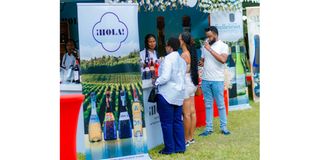Prime
2025 Wine Festival: Redefining Tanzanian luxury hospitality

Tourists now ask specifically for Tanzanian wines when staying at their hotels. PHOTO | ANGANILE MWAKYANJALA
What you need to know:
- The annual wine festival, now in its second edition, brought together wine lovers and local winemakers for a lively evening of celebration—spiced with supu ya pweza, a beloved local octopus soup delicacy, and homegrown music
Bongo Flava music blaring in the heart of Dar es Salaam’s city centre turned the normally serene backdrop of the Serena Hotel into a vibrant scene.
The annual wine festival, now in its second edition, brought together wine lovers and local winemakers for a lively evening of celebration—spiced with supu ya pweza, a beloved local octopus soup delicacy, and homegrown music.
It marked a milestone and a tribute to local wineries that have quietly but steadily built a notable presence in Tanzania and beyond—one that can no longer be overlooked.
Gone are the days when South African wine brands were the only names associated with crisp, rich, and surprisingly affordable wines in the local market.
The accommodation industry is closely intertwined with the wine and dining experience.
Serena Hotels, which also operates a property inside Serengeti National Park, has seen a growing number of tourists requesting local wine brands in all their establishments.
“In all our restaurants, we offer fine dining—and that must be paired with fine wines,” said Seraphin Lusala, Director of Sales and Marketing at Serena Hotel, Dar es Salaam.
“We thought we should host this festival and invite local wines, while also showcasing foreign brands so people can appreciate what we have.”
Most local wine factories in Tanzania are located in Dodoma, a region whose semi-arid climate, long dry spells, and cool nights make it ideal for grape cultivation.
Dodoma also carries a long tradition of winemaking, dating back to the 1960s, when Italian Christian missionaries established altar wine production in the region.
Over the years, local farmers have acquired the knowledge and expertise to grow grapes that meet the quality demanded by wine processors.
Walking into the Serena Hotel grounds for the wine festival was a delightful experience, where one was greeted by a kaleidoscope of cultures, races, and age groups, all holding glasses of local wine and dancing to the music.
The DJ remained out of sight, as the attention shifted to booths adorned with bottles from Tanzania’s renowned wine producers.
From Cetawico, Mawella, and Mohans to Alko Vintages, the latter of which produces the flagship Dompo wine—all had set up eye-catching booths that celebrated decades of local dedication and steady improvement in wine quality.
For Serena Hotel, a juggernaut in Tanzania’s hospitality and tourism sector, it made strategic sense to partner with local wineries, particularly as wine sales across their hotels continue to show a positive trend.
Tourists from China, Europe, and even South Africa now ask specifically for Tanzanian wines when staying at their hotels.
Seraphin, the mastermind behind the wine festival, firmly believes that local wine brands can rival international ones.
“People haven’t really tasted our wines. But once they do, they’ll discover that we have products that are almost as good—or even better—than those from France, South Africa, and other countries,” he said with confidence.
The festival quickly filled with guests from all walks of life, including international hotel patrons, many of whom left not only with fond memories of Tanzania but also with bottles of local wine in hand.
“Last year’s wine festival received so many positive reviews and recommendations from international visitors,” Seraphin added.
As a five-star hotel property, Serena must be confident in the quality of the local wines it stocks in its restaurants, bars, and festivals.
That confidence has been earned. Tanzanian wines have improved tremendously and are now attracting interest from global investors.
While the government continues its efforts to promote tourism, hotels can play a crucial role by championing local wines, helping to increase exports and enhancing Tanzania’s global brand through its wine industry.
“When tourists plan their trips, the first thing they check is accommodation. The next is the food and drink menu. Wines are part of that. If they see Tanzanian wines listed, that exposure alone can spark curiosity, even potential investment,” Seraphin explained.
“Many investors came to Tanzania just as tourists, but their experiences here led to deeper engagement.”
He added that local wines need to compete not only in quality but also in pricing and visibility.
“With so many wines flooding in from South Africa and other countries, local producers must ensure their wines are of excellent quality, competitively priced, and well promoted.”
Just a few steps from the main stage was the booth for Alko Vintages, where SweetBertha Rwabizi, their marketing manager, was welcoming guests.
The esteemed winery has entered into a landmark partnership with Air Tanzania, serving Image Wine as the exclusive in-flight wine on international routes.
This positions the brand at the forefront of Tanzania’s tourism marketing, as it becomes one of the first local products encountered by incoming visitors.
“This is our platform to introduce Tanzanian wines to the world,” SweetBertha said.
“It’s how people find out that Tanzania produces wine and that Dodoma is our wine region.”
She further explained that Tanzania currently imports approximately 50 million litres of wine annually, yet local producers account for less than 10 percent of that market.
“There’s still huge room for growth,” she said.
“We have a unique variety of grapes that are hard to find elsewhere. With stronger collaboration between government and industry, we can take our wines global.”
Alko Vintages also distributes several other wine brands, including Dompo, which comes in various flavours, such as altar wine and sweet red varieties.
Cetawico, another key wine factory based in Dodoma, supplies its products to safari lodges and hotels across national parks.
Their wines have become a favourite among tourists and are exported in large quantities to China. Jacob Laban, the company’s zonal manager, expressed pride in their achievements.
Founded in 2005, Cetawico has played a vital role in promoting Tanzanian wines on the international stage.
“We export a lot to China, and we’ve started shipping to Germany. South Africa is next,” he said.
“Having ‘Tanzania’ on the wine label is significant. Once someone tastes the wine, it’s only natural to check the bottle and see where it’s from. That alone helps promote Tanzanian tourism.”
He added confidently, “Our Presidential Reserve brand surpasses many wines from other countries. Just try it.”
Mawella, another participant, saw their booth flooded with celebrants. Noella, their Brand and Marketing Manager, was present with a sommelier offering tastings of the Flacko Family Wine—available in white, red, sweet, dry, and a sweet rosé, one of the few locally produced rosés, made directly from their Dodoma vineyard.
Mawella has forged a partnership with Serena Hotels and now features among the local wines served to both domestic and international guests.
“We’re here today so that everyone attending the festival can taste our wines,” said Noella.
“Tourists visiting Tanzania can take a bottle home, and that helps extend the experience of our country beyond their trip.”
Tanzanian wines are stepping into a highly competitive space, aiming to penetrate the lucrative hospitality and tourism sectors.
Selling to safari lodges, hotels, and camps gives local brands increased visibility—and having “Tanzania” on the label contributes significantly to national branding.
As Tanzania continues to solidify its position not only as a top African destination but also as a global one, local wines have a special role to play.
In a world where experiences are curated through taste, sight, and sound, Tanzanian wines offer an authentic way to understand the country’s spirit—one sip at a time.



